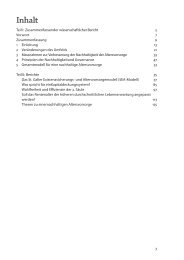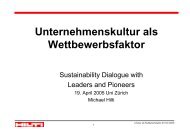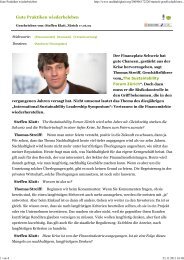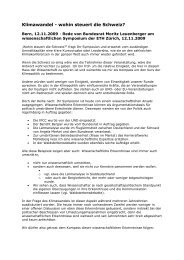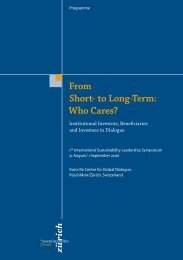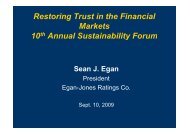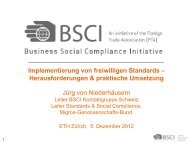Fostering Corporate Responsibility through Self- and Co-regulation
Fostering Corporate Responsibility through Self- and Co-regulation
Fostering Corporate Responsibility through Self- and Co-regulation
Create successful ePaper yourself
Turn your PDF publications into a flip-book with our unique Google optimized e-Paper software.
Appendix<br />
Partnering<br />
Frivillig gældsrådgivning<br />
Date of creation<br />
2007<br />
Public bodies<br />
Ministry of Social Affairs <strong>and</strong><br />
Integration<br />
Denmark<br />
After noting an increased lack of basic economic competencies among their customers,<br />
Danish banks decided it was in their long-term interest to address this problem holistically,<br />
partly <strong>through</strong> precautionary measures (enhancing fi nancial underst<strong>and</strong>ing) <strong>and</strong> partly by<br />
addressing the consequences. The “Voluntary Debt <strong>Co</strong>nsultancy” relates to the latter. It helps<br />
disadvantaged people gain a general overview of their personal fi nancial situations <strong>and</strong><br />
motivate them to pay off their debts. It is a multi-stakeholder initiative of the Ministry of<br />
Social Affairs, the Danish Bankers Association <strong>and</strong> various NGOs. The role of the government<br />
is initiation, monitoring <strong>and</strong> funding.<br />
Link: www.finansraadet.dk/bankkunde/information-og-raadgivning/frivillig-gaeldsraadgivning.aspx<br />
Mikrokreditfonds<br />
Date of creation<br />
2000<br />
Public bodies<br />
Federal Ministry of Labour<br />
<strong>and</strong> Social Affairs<br />
Germany<br />
The Federal Ministry of Labour <strong>and</strong> Social Affairs works together with GLS Bank, a pioneer<br />
in microcredit services, <strong>and</strong> dozens of microfi nance institutions to offer microcredits to<br />
otherwise possibly “unbankable” people in order to help them start small businesses. With<br />
the microcredit fund, Germany’s federal government aims to improve access to capital for<br />
small businesses <strong>and</strong> start-ups. Since its launch in 2010, more than 10,000 credits have been<br />
awarded, which signifi cantly exceeded the original plans. At the moment, the crucial task<br />
is building permanent <strong>and</strong> sustainable microfi nance structures that provide specifi c target<br />
groups with fast <strong>and</strong> easy access to capital.<br />
Link: www.mikrokreditfonds.de<br />
France Active<br />
Date of creation<br />
1988<br />
Public bodies<br />
Caisse des Dépôts et<br />
<strong>Co</strong>nsignations; the related<br />
Fonds de <strong>Co</strong>hésion Sociale;<br />
the departmental <strong>Co</strong>nseil<br />
Généraux<br />
France<br />
France Active is an initiative that helps potential entrepreneurs lacking suffi cient securities<br />
to obtain bank loans by offering them guarantees at reasonable rates <strong>and</strong> conditions. The<br />
organisation was founded in 1988 by the public bank Caisse des Dépôts et <strong>Co</strong>nsignations,<br />
the NGO Fondation de France, the mutual bank Crédit <strong>Co</strong>opératif, the mutual insurance<br />
company Macif <strong>and</strong> the Agence pour la création d’entreprise (APCE). The initial aim was to<br />
help the unemployed become self-employed or launch small enterprises. In 1995, it created<br />
23 departmental sections to h<strong>and</strong>le direct client contact. The initiative has exp<strong>and</strong>ed its<br />
target group to include people in precarious working situations as well as organisations that<br />
employ people who have disabilities or are otherwise disadvantaged on the labour market.<br />
Link: www.franceactive.org<br />
<strong>Co</strong>mité Nacional Anti-<strong>Co</strong>ntrefaçon<br />
Date of creation<br />
1995<br />
Public bodies<br />
General Inspectorate of the<br />
Ministry of Industry; various<br />
public partners<br />
France<br />
Created in April 1995, the ”<strong>Co</strong>mmittee Against <strong>Co</strong>unterfeits (CNAC)” unites public entities<br />
<strong>and</strong> private actors in efforts to suppress the violation of intellectual property rights <strong>through</strong><br />
counterfeiting. The main goal is to improve the effi ciency of the entire national system. It<br />
also provides consultation <strong>and</strong> serves as a conduit for information between government <strong>and</strong><br />
industry. Its creation was advocated by the General Inspectorate of the Ministry of Industry<br />
during the preparation of the Act of 5 February 1994 on the punishment of counterfeiting<br />
(Loi Longuet). The CNAC is traditionally chaired by a member of parliament, while the<br />
secretariat is run by a civil servant.<br />
Link: www.contrefacon-danger.com<br />
52




